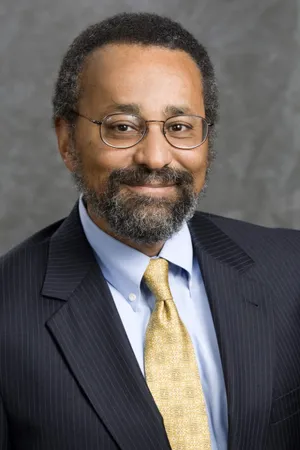The 'most important mentor' ever: Chris Edley, legal and education scholar, has died
Christopher Edley Jr. was restless and impatient when working to expand access to education. He explained complicated concepts with clarity and often self-effacing humor. One former U.S. president remembered his brilliant mind and kind heart. Colleagues and students called him the most important mentor they ever had.
Edley, a prominent civil rights scholar who held posts at Harvard University and the University of California, Berkeley and senior titles under some of the most prominent Democrats in the U.S., died Friday morning at the Stanford University hospital in California, according to his wife, Maria Echaveste. He was 71.
Doctors have not determined a cause of death, Echaveste said.

Many recalled the breadth of his impact across multiple disciplines.
“He was extraordinarily respected in the academy but also in public policy and public service circles,” said Ann O’Leary, an attorney and political adviser who helped him to establish a program for economic mobility called the Opportunity Institute. “He was able to comfortably debate a law review article and equally be in the halls of the White House or the state capitol to explain those really complicated ideas” about racial and social equity.
Civil rights leader and legal scholar at Harvard, UC Berkeley
Edley, a Boston native and second-generation Harvard Law School graduate, co-founded Harvard’s Civil Rights Project following a court ruling in the mid-1990s that targeted race-conscious admissions. He taught at Harvard law and simultaneously worked on affirmative action for President Bill Clinton, advising the White House on leading efforts to retain race-conscious admissions. He remained at Harvard for nearly a quarter century.
Edley later served as law school dean at UC Berkeley for nearly a decade. Under his leadership, the school erected facilities, created centers and increased student grants. More recently, he oversaw Berkeley’s education school as an interim dean.
As a legal scholar, he had an immense impact in education and especially in educational equity, said Erwin Chemerinsky, dean of Berkeley Law. His leadership was “transformative,” said Chemerinsky, who was Edley's classmate at Harvard Law. Chemerinsky said he relied on the former dean’s advice in navigating the bureaucracy at the University of California.
Edley held policy and budget positions in the White House under presidents Jimmy Carter and Bill Clinton.
He served as assistant director of the White House domestic policy staff in the Carter administration, where his responsibilities included welfare reform, food stamps, child welfare, disability issues and Social Security.
He was a senior adviser to Clinton’s transition team and later worked as associate director for economics and government at the White House Office of Management and Budget from 1993 to 1995. In addition, he served as special counsel to the president and led the administration’s review of affirmative action programs.
White House stints starting early in his career
Edley held advisory positions in the presidential campaigns of Michael Dukakis, Al Gore, Howard Dean, Barack Obama and Hillary Clinton. After the 2008 election, he helped advise Obama’s transition team. The two met at Harvard Law School, where Edley was one of Obama’s professors.
Edley met his wife, Echaveste, during a meeting in the Roosevelt Room while they were both working at the White House. She served as Bill Clinton’s deputy chief of staff.
"I thought he talked too much," she said, laughing. "He would say he knew more than everybody in that room."
She added: "He did not have ... that insecurity that some of us have when we're in those places, those questions of 'do we belong?'" said Echaveste, a first-generation Mexican American and the child of farmworkers.
'A journey that must continue'
Echaveste loved his "intellectual curiosity" and their debates about various topics. He was supportive of her career as a lawyer and political official. As they raised their children, they would discuss ideas in the car after dropping them off at school. "We'd look at each other and say how lucky we are."
But Edley, who was Black and whose father also attended Harvard Law before him, had a distinct view on what it meant to exist as a person of color in the United States. Despite his achievements, his father struggled to get a job.
Edley was often behind the scenes in Washington, but people in leadership took note of his ideas.
“Chris Edley had a brilliant mind and a kind, good heart that he put to use to build a better, fairer, more just America,” Bill Clinton said in a statement.
“From his groundbreaking academic career to his service in multiple key roles in my administration, he always believed that law and policy are ultimately about people," the statement said. "He mastered the minute details but never lost sight of the big picture – giving more people the chance to live their best lives. He is gone far too soon, but his legacy will endure."
Edley’s interest in civil rights underpinned each of his professional chapters. And he consistently endeavored to make scholarship “practical and immediately impactful on public policy and the debates of the day,” O’Leary said. O’Leary largely credits Edley with salvaging affirmative action in the face of resistance throughout the 1990s.
Reflecting on the Supreme Court’s undoing of affirmative action last year and ongoing pushback against diversity, equity and inclusion, O’Leary said Edley understood that generational change requires a team of people.
"In some sense, he was impatient and irascible and never satisfied that we were doing enough – because we weren't doing enough. The way to honor him is to keep at this work,” she said.
“This is a journey that must continue.”
Disclaimer: The copyright of this article belongs to the original author. Reposting this article is solely for the purpose of information dissemination and does not constitute any investment advice. If there is any infringement, please contact us immediately. We will make corrections or deletions as necessary. Thank you.



